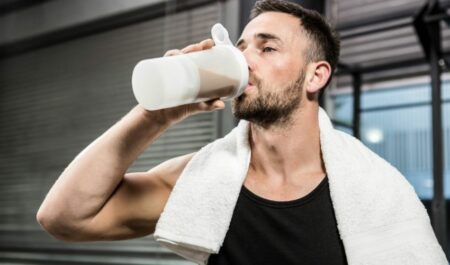Protein is required for the repair and development of muscle tissue. In order to counteract this, many people use protein supplements in the form of shakes in conjunction with their exercise routine. The best time to have a protein shake, on the other hand, is a strongly disputed subject.
Some people feel that drinking a protein shake before an exercise is the greatest option, while others say that drinking one after a workout is the best option.
This article discusses whether it is preferable to consume a protein shake before or after your training session.

What Amount Of Protein Do You Require?
Dietary protein intake should not exceed 0.36 grams per pound (0.8 grams per kilogram) of body weight (Recommended Daily Allowance, RDA).
The recommended daily allowance (RDA) is the estimated quantity of a nutrient that a person need to avoid deficiencies. It does not define the amount of the supplement required to achieve optimal body composition or health.
When it comes to protein, it’s evident that the recommended daily allowance is far too low to adequately support muscle regeneration and development.
Rather than the RDA of 0.72 grams per pound (1.6 grams per kilogram), research shows that persons who regularly strength train may require double that much, or 0.72 grams per pound (1.6 grams per kilogram).
To maintain a healthy weight for a 150-pound (68 kg) individual, a minimum of 109 grams of protein must be consumed each day.
Spread this quantity over three to four meals that are consumed every three to four hours to achieve the best outcomes.
When you’re between meals, a protein shake is a great alternative. It may be used as a snack or consumed after a workout. Protein powders generally provide 25–30 grams of protein per scoop, depending on the manufacturer.
Is It Important To Have A ‘Anabolic Window’?
Many individuals assume that having a protein shake within 30 minutes after exercising will help them get the most out of their workouts.
It is during this 30-minute window, also known as the “anabolic window,” that your muscles become like a sponge for protein, allowing you to gain muscular mass and strength faster.
It is believed that if you ingest protein outside of the anabolic window, your body will not be able to properly utilize it and hence will not be able to develop muscle.
According to current research, this anabolic window of opportunity may last considerably longer than 30 minutes and may not be confined to the 30 minutes following exercise.
In reality, when it comes to improving muscle repair and development, it may not make a difference whether you have a protein shake before or after your exercise session.
Is It Better To Boost Your Protein Intake Before Or After Working Out?
One research looked at the benefits of ingesting protein before or after an exercise on muscular strength and size, and the results were mixed.
21 males were randomly assigned to one of two groups, each of which was given a protein shake containing 25 grams of protein. The first group received it right before their workout, whereas the second group received it soon after their workout, as seen in the chart.
Everyone participated in a full-body workout three times each week for a total of ten weeks.
It’s worth noting that the researchers discovered no statistically significant variations in muscle strength or size across the groups. These findings imply that as long as you ingest protein in the vicinity of your workout, it makes no difference whether you consume it before or after training.
Because of this, you have the option of deciding on a time that is most convenient for you.
It Is Possible That Daily Protein Consumption Is More Crucial.
When it comes to increasing muscle and strength development, the evidence on the relevance of ingesting protein in the hours before and after exercises is inconsistent.
Some studies have questioned whether ingesting protein in the hours before and after a workout is indeed required.
A few studies have suggested that it is advantageous, while other investigations have found that it has no impact.
These diametrically opposed findings continue to inspire fresh study into the benefits of ingesting protein before and after exercise.
In general, studies have discovered that total protein consumption is the most reliable predictor of muscular strength and growth, regardless of whether it is consumed near to exercise or at other times of the day.
As a result, when it comes to developing muscle growth and strength, the amount of protein you take each day is likely more essential than the time you consume it.
What Is The Best Way To Reach Your Protein Goals?
Protein may be found in both animal and plant-based diets, and both can help you reach your daily protein need.
Animal sources of protein such as meat, chicken, dairy, and fish are of high quality, but plant-based sources of protein such as nuts, beans, legumes, and soy-based products are of high quality.
According to research, animal-based protein is superior to plant-based protein when it comes to muscle growth, but it’s advantageous to consume a balance of the two types of protein.
Adding protein shakes to your diet can also be a simple method to enhance your protein consumption, especially if you are unable to acquire enough from food alone.
The following are the most prevalent varieties of protein powders available on the market:
Whey protein is a kind of protein found in milk. Whey protein is a milk protein that is easily absorbed by the body, making it a good choice for pre- or post-workout nutrition. It also includes bioactive proteins, which have the potential to provide additional health advantages.
Casein is a kind of protein. Casein is the second kind of milk protein, and it is digested considerably more slowly than whey, making it excellent for consumption during periods of fasting, such as sleep. Furthermore, some types of casein protein provide up to 60% of the recommended daily allowance (RDA) of calcium per scoop.
Egg protein is a kind of protein. Egg protein powders are manufactured only of egg white protein and include no other ingredients. These protein supplements digest at a medium rate and are one of the most costly options available on the market today.
Protein derived from soy. For vegetarians, soy protein is a complete protein supply since it includes all of the necessary amino acids, making it one of the few plant proteins that does so.
Protein derived from rice and peas. The proteins found in rice and pea do not contain all of the required amino acids; nonetheless, when combined, they form a complete protein source. They have a minimal allergenic potential, making them appealing to people who are allergic to eggs, dairy, or soy.
Are High-Protein Diets Considered To Be Safe?

Protein shakes are safe to consume by healthy individuals.
Having said that, shakes are not intended to be a meal replacement. When taking them, it’s recommended to do so between meals, or if you want, around your exercises.
Many people are concerned that using protein supplements in conjunction with a high-protein diet would have a negative impact on their overall health.
This is due to the fact that high-protein diets have been incorrectly linked to renal illness and osteoporosis, a condition characterized by weak and brittle bones, among other things.
Those with healthy kidneys, on the other hand, are not at risk from a high-protein diet, according to the findings.
Even people who consume a high protein diet on a regular basis, such as weightlifters, have healthy kidneys in most cases.
A high-protein diet, on the other hand, has been linked to increased bone health in studies. The reason for this might be that protein enhances bone mineral density and lowers the risk of bone fractures, particularly when paired with strength exercise.
If your doctor or registered dietitian advises you to restrict your protein consumption because of a medical issue, there is no need to be concerned about following a high-protein diet.
The Bottom Line
Following exercise, protein is essential for the repair and regeneration of your muscles, and many individuals drink protein shakes after their workouts to help in this process of repair and regeneration.
Researchers have shown that whether you consume a protein shake before or after your workout makes little difference in terms of results. Surprisingly, the amount of protein you consume on a daily basis is the most important factor.
Despite the fact that protein drinks before exercises and in between meals might be beneficial, make sure you’re getting enough protein throughout the day. Both diets and supplements can assist you in reaching your objectives.
When used in conjunction with a high-protein diet, protein shakes pose little or no damage to the health of otherwise healthy persons who consume them.
In fact, ingesting more protein than the current recommended daily allowance provides a number of health benefits.
FAQs.
Consuming protein in the hour or so before you hit the gym will jumpstart any muscle protein synthesis that will take place while you’re working out. You will reap the benefits of raised blood amino acids not only after your workout, but also while you are working out because muscle protein synthesis can actually continue to rise for up to three hours after consuming protein.
It is ideal to have some form of protein anywhere from 30 minutes to three hours before engaging in physical activity. The more substantial the meal, the longer you are able to rest before engaging in physical activity.
1. It is recommended that you consume a snack that is high in carbohydrates, contains a modest amount of protein, and is low in fat prior to engaging in physical activity. Eating 30–60 minutes before.
2. If you plan to eat between two and three hours before your workout, it is suggested that you consume a meal that is high in carbohydrates, high in protein, and low in fat.
